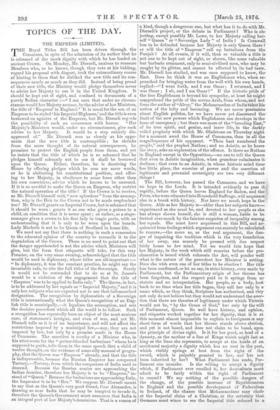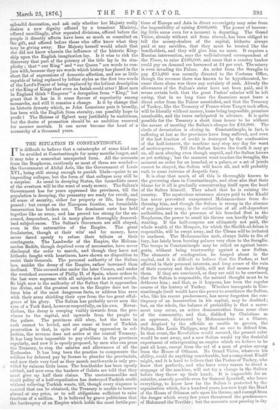TOPICS OF TTTE DAY.
THE EMPRESS (LIMITED).
THE Royal Titles Bill has been driven through the Commons, in spite of the admission of its author that he is ashamed of the mock dignity with which he has loaded an ancient Crown. On Monday, Mr. Disraeli, anxious to reassure Members who, as he knows, though they -vote at his bidding, regard his proposal with disgust., took the extraordinary course of hinting to them that he disliked the new title and its con- sequences nearly as much as they did. Instead of being proud of their new title, the Ministry would pledge themselves never to advise her Majesty to use it in the United Kingdom. It should be kept out of sight, and confined to documents of a purely Indian character :—" I am sure that under no circum- stances would her Majesty assume, by the advice of her Ministers, the title of Empress' in England." It is usual for the son of an Empress to be styled his Imperial Highness,' and the title is even bestowed on agnates of the Emperor, but Mr. Disraeli regards the possibility of such an occurrence with horror. "Her Majesty's Ministers would, under no circumstances, give such advice to her Majesty. It would be a step entirely dis- approved of." Mr. Disraeli sees as clearly as his oppo- nents that the new title is contemptible ; he shrinks from the mere thought of its natural consequences, he promises to protect the English people from them, and yet he insists that the title of which he is so ashamed that he pledges himself solemnly not to use it shall be bestowed upon the Queen. Either, therefore, he is deceiving the House by offering pledges which he sees are mere words, or he is abdicating his constitutional position, and offer- ing to her Majesty, in obedience to some force other than his own conscience, advice which he knows to be unsound. If it is so needful to make the Queen an Empress, why restrict the natural operation of the title ? If the Crown is to receive, as Mr. Disraeli himself said, " new splendour" from the assump- tion, why is the Heir to the Crown not to be made resplendent too ? Mr. Disraeli grants an Imperial Crown, but is ashamed that it should be worn ; grants it as one who gives a guinea to a child, on condition that it is never spent ; or rather, as a stage- manager gives a crown to his first lady in tragic parts, with an understanding that it is only to be worn upon the boards. Lady Macbeth is not to be Queen of Scotland in home life.
We need not say that there is nothing in such a concession to the educated opinion of the country to reconcile it to the degradation of the Crown. There is no need to point out that the danger apprehended is not the advice which Ministers will give, but the form that etiquette will take, for this very Premier, on the very same evening, acknowledged that the title would be used in diplomacy, where titles are all-important:— "In diplomacy, it was the constant practice, he might say the invariable rule, to cite the full titles of the Sovereign. Surely it would not be contended that to do so at St. James's would be a violation of the engagement that the title of ' Empress' was to be applied to India only." The Queen, in fact, is to be addressed by her equals as " Imperial Majesty," and it is only her subjects who are expected not to use that full-mouthed designation. The recognition by diplomatists of a Sovereign title is internationally what the Queen's recognition of an Eng- lish title is municipally, it legalises the assumption, and sets the decisive precedent which all the world is to follow. Such a recognition has repeatedly been an object of the most anxious care, of statesmen's intrigue, and even of war, and yet Mr. Disraeli tells us it is of no importance, and will not affect the restrictions imposed by a municipal law,—nay, they are not imposed by law, but only by a promise made in the House of Commons. The assertion is worthy of a Minister who, in his utter scorn for the " gutter-blooded barbarians " whom he is supposed to guide, tells them in the same speech that a child of twelve thought, on the evidence of some silly manual of geogra- phy, that the Queen was "Empress " already, and that the title is indispensable, because the Russian Emperor has conquered Tartary,—Tartary, from which the conquerors of India used to descend. Because the Russian armies are approaching the Indian frontier, therefore her Majesty is to be "Empress," in- stead of " Queen." Because the barbarians are approaching Italy, the Imperator is to be "Rex." We suppose Mr. Disraeli meant to say that as the Queen's very good friend, Czar Alexander, is drawing so near India that he may be tempted to invade it, therefore the Queen's Government must announce that India is an integral part of her Majesty's dominions. That is a reason of
a kind, though a dangerous one, but what has it to do with Mr. Disraeli's project, or the debate in Parliament ? Who is ob- jecting, except possibly Mr. Lowe, to her Majesty calling her- self " Queen " or " Sovereign Lady " of India ? Is Cornwall less to be defended because her Majesty is only Queen there ? or will the title of " Empress " call up battalions from the
Punjab At all events, if it will, then so valuable a title is not one to be kept out of sight, or shown, like some valuable but barbaric ornament, only to semi-civilised men, who may be caught by its glitter, and cannot be affected by its bad taste.. Mr. Disraeli has studied, and was once supposed to know, the' East. Does he think it was an Englishman who, when re- proached for bringing water from the well with his own hands, replied—" I went forth, and I was Omar ; I returned, and r was Omar ; I sit, and I am Omar?' If the historic pride of the free Englishman is beyond his sympathy, at least he might comprehend the pride of the serene Arab, from whom, and not from the author of "Alroy," the Mohammedan of India takes his- notion of the lofty and becoming. We are never pessimists- about English politics, for we have never yet discovered the limit of the new powers which Englishmen can develope in the hour of emergency ; but there was more of the "brooding East,' of its true spirit, and genius, and inner life, in the darkly veiled prophecy with which dr. Gladstone on Thursday night for a moment awed the House of Commons, than in all the magniloquence of his opponent. "Thou hest numbered the people," said the prophet Nathan; and no Asiatic, as he hears the story, asks an explanation of-the offence. Is there no Nathan, in England except in the Opposition,—no one to tell the Queen. that even in Asiatic imagination, when grandeur culminates it declines ; that even to an Asiatic, in whose historic mind time- has little place, the exercise of power and the assertion of legitimate and perennial sovereignty are two very different things ?
The Bill, however, has passed the Commons, and we have no hope in the Lords. It is intended evidently to pass it rapidly, before the Queen leaves England for Baden, and the who were educated into Household Suffrage, will acquiesce also in a break with history. Nor have we much hope in the Queen. Able as her Majesty is—abler than her subjects know— experienced as she must be, and devoted to her people as she. has always shown herself, she is still a woman, liable to be fretted over-much by the faintest suspicion of inequality among, her equals. She must have acquiesced in this Bill, and ac- quiesced from feelings which argument can scarcely be calculate& to remove,—the more so, as the real argument, the dan- ger of impairing the tradition which is the very foundation of her sway, can scarcely be pressed with due respect fairly home to her mind. Yet we would fain hope that her Majesty, in the week which still remains before the pro- clamation is issued which exhausts the Act, will ponder well what is the nature of the precedent her Minister is setting-. Does she wish even one of her titles to be elective ? Her title has been confirmed, or"let us say, in strict history, even made by Parliament, but the Parliamentary origin of her throne has been forgotten, and the respect paid to it springs from nc- statute and no interpretation. Her people, as a body, lock back to no time when her title began, they call her only by a name which, as they think, Scripture has authorised, and they- not only do not believe but they would not understand the asser- tion that there are theories of legitimacy under which Victoria would not be, " by the Grace of God," but only by the will of Parliament, Queen. So well have history, and oftion, and etiquette worked together for her dignity, that it is at this moment almost impossible to explain to foreigners in any short form of words that her throne stands above election, and yet is not based, and does not claim to be basal, upon the principle of divine right. Is it for her good, as head of a dynasty, as the mother of a line of Kings which might last as long as the lines she represents, to accept at the hands of an accidental majority a dignity which has no root in the past, which visibly springs at best from the right of the sword, which is palpably granted to her, and has not been inherited by her? What Parliament has nade Par- liament can unmake. Is she willing to accept a dignity which, if Parliament ever recalled it, her descendants must admit to be fairly within the right of Parliament to cancel? We say nothing of the possible dangers of the change, of the possible increase of Republicanism in England and the possible development of Federalism in Ireland, of the chance that Mohammedans may chafe at the Imperial claim of a Christian, or the certainty that Germans must wince to see the Imperial title reduced to a



































 Previous page
Previous page